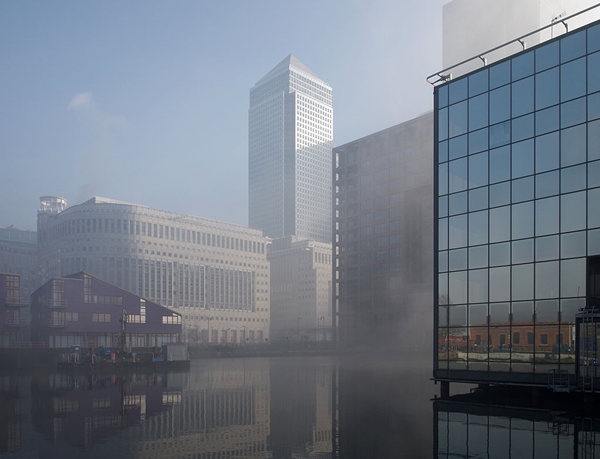
 |
|
Early morning mist and smog rises at London's Canary Wharf in 2014. Photo provided to chinadaily.com.cn |
London is famous for its fog, but this week it was smog that made the headlines as the city's air pollution levels surpassed those in Beijing, well, at least for a day.
The comparison between the two cities was first made on Sunday by Simon Birkett, who runs the Clean Air London campaign, according to the Greenpeace website.
The Air Quality Index (http://aqicn.org), based in Beijing, employs official air-quality data provided by environmental protection agencies in some 70 countries. It compares those numbers to a scale used by the US EPA, and the data are published in real time.
Readings at 3 pm on Monday showed that some locations in the British capital had higher particulate levels than in China's capital. London's air on Monday afternoon contained 197 micrograms per cubic meter for particulate matter (PM2.5). In Beijing, the reading was 190.
On Tuesday morning, the UK Department for Environment Food and Rural Affairs said that air pollution levels for the Greater London area were still "very high". The reading in London on Tuesday for fine particulate matter was 157, higher than Shanghai's but lower than Beijing's.
The surprising comparison didn't last long, though. On Thursday, Beijing clocked a 408, which is hazardous and means stay indoors, while London settled down to an acceptable 91.
In London, the culprits for the bad air are wood-burning stoves and automobile traffic, exacerbated by mild wind conditions, according to King's College in London. The school estimates that 9,400 Londoners die prematurely every year due to air pollution.
More than 1 million London homes have wood burning stoves, and 175,000 new ones are installed each year, according to The Telegraph. Demand for the stoves has jumped as customers look to pare their energy costs.
London Mayor Sadiq Khan issued the highest-possible air pollution alert in the city for the first time on Monday, and said on Tuesday that the city's "filthy air" is a "health crisis".
"We're delivering the strongest emission measures to clean up our bus fleets, charging for the dirtiest most toxic diesels and bringing forward and then extending the Ultra Low Emission Zone," Khan said in a statement on london.gov.
"The government urgently need to do their bit. They need to devolve more powers to London and introduce a national diesel scrappage scheme to rid our streets of the dirtiest vehicles," the mayor said.
"They also need to reform vehicle excise duty and bring in a new Clean Air Act that finally tackles this problem and means that Londoners don't have to be afraid of the air we breathe," Khan said.
Areeba Hamid, clean air campaigner for Greenpeace, said: "Air pollution is a blight on London, so it is hugely encouraging to see the mayor prioritizing this issue. … But we also need to see action nationally to tackle the impact of diesel fumes on public health."
Unfortunately, smog is not new to London. The Great Smog of 1952 was caused by cold weather combined with a lack of wind that led to a concentration of airborne particulates, mainly from coal burning. The smog lasted five days in December before dispersing when the weather changed.
As many as 12,000 people were estimated to have died from The Great Smog's ill effects on the human respiratory system.
In China, more than half of the cities monitored by the Ministry of Environmental Protection reported air pollution Wednesday.
About 57.8 percent of Chinese cities monitored by the ministry, including Beijing, reported varying degrees of air pollution, according to real-time data on the ministry's website.
Of the 338 cities monitored, 7.1 percent, including Shijiazhuang, the capital of North China's Hebei province, reported serious air pollution, with air quality index readings exceeding 300 as of Wednesday.
Another 12.8 percent of the cities, including Tianjin, were experiencing heavily polluted air, with AQI readings between 201 and 300, said the ministry.
Contact the writer at williamhennelly@chinadailyusa.com